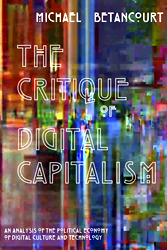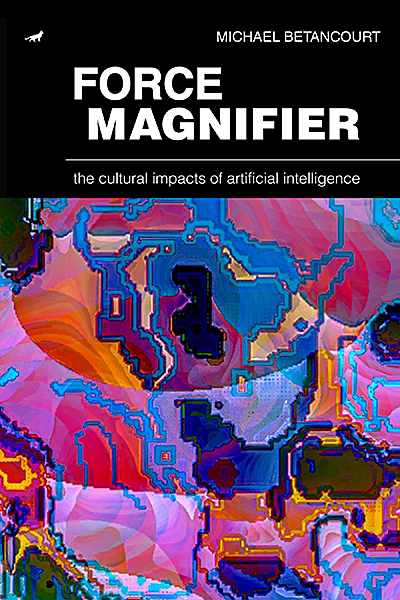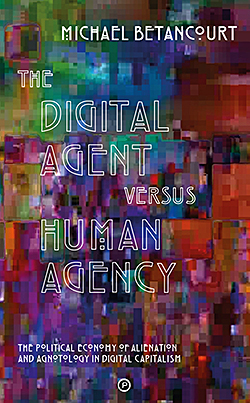PORTFOLIO |
 |
|
|
|
|
|
 |
| |
|
|
 My book The Critique of Digital Capitalism identifies how digital technology has captured contemporary society in a reification of capitalist priorities. The theory proposed in this book is the description of how digital capitalism as an ideologically �invisible� framework is realized in technology.
These posts are excerpts from my on-going research: My book The Critique of Digital Capitalism identifies how digital technology has captured contemporary society in a reification of capitalist priorities. The theory proposed in this book is the description of how digital capitalism as an ideologically �invisible� framework is realized in technology.
These posts are excerpts from my on-going research:
CTheory articles on digital capitalism and media theory
from Hz Journal, no. 19, July 2014: "Critical Glitches and Glitch Art"
"Das exakte Leben" in Suddeutsche Zeitung,
Thomas Steinfeld, September 8, 2016 [.pdf]
Nothing Left to Steal, Dmitry Orlov, March 18, 2011
If you are looking for more on agnotology, digital capitalism or automated/immaterial labor, look at my published articles, posted in .pdf and with links to the magazines, under "articles" on MichaelBetancourt.com.
|
| |

|
 |
The Aesthetic Problem Posed by Digital Capitalism
story © Michael Betancourt | published July 24, 2021 | permalink |



 |
| 
|
 |


|
 |
|
Here is a preview from my new book, Research Art: glitches, poetics, typography and the aura of the digital available soon:
Composer John Cage noted the �problem of history� in the 1950s; it is an issue that has grown more important, rather than less, in the decades since. Artists adopting a self-conscious positioning in relation to a specific history (tradition)�whether in a sense of continuing it, or in the sense of escaping from it�unifies the positivistic dimensions of Modernism and Post-Modernist alike. To the extent that the Contemporary embrace of relativism is �ahistorical,� it is not an escape from this avant-guardiste positivism, but a response to the post-structural critique that introduced a plurality of directions that now dominate discourse within the gallery-fair-museum network. This expansion of aesthetic opportunity has not minimized the need for self-conscious positioning, it has starkly highlighted it. The issue in confronting the Contemporary is to separate emotional, dialectical, traditional conceptions of �opposition� and �resistance� (the heritage of the avant-garde) to consider a tactical relaction that demonstrates Cage�s koan-like observation:
One does not then just any experiment, but does what must be done; one does not seek by his actions to arrive at money, but does what must be done; one does not seek by his actions to arrive at fame (success), but one does what must be done; but does what must be done; one does not seek by his actions to provide pleasure to the senses (beauty), but one does what must be done; one doe not seek by his actions to arrive at the establishment of a school (truth), but one does what must be done. One does something else. What else?
Cage, J. Silence (Middleton: Wesleyan University Press, 2011) p. 68.
|

|
|
 read more read more
|

|
| |

|
| |
 |
Force Magnifier
story © Michael Betancourt | published January 20, 2020 | permalink |



 |
| 
|
 |


|
 |
 | � � |
Now Available! in print and
ebook format
�What exactly does AI automate?�
Betancourt begins with the obvious answer, �human labor,� and ends with the nature of value created in capitalism. His analysis was written for a lecture at the Aspen Institute�Germany conference �Humanity Enabled: AI & the Great Economic Awakening� in Berlin on March 25-26, 2020. The �great decoupling� of labor from productivity and value suggests the potential for a post-labor economy, and the expansion of the �society of leisure� formerly reserved for only the dominant social classes. This book concerns the social, cultural, and economic barriers to the development of a fairer, egalitarian, and more democratic society in terms of a broad, kaleidoscopic array of tendencies including the gamification of social activity by social credit, the role of marketing in popular media, the authoritarian usurpation of democracy in the smart city, and the proposal of universal basic income as a palliative for the replacement of human labor by machinery. Opposition to the emergence of the �society of leisure� is not economic but cultural, a confluence of religious and social prohibitions on leisure that simultaneously devalue, demonize, and disenfranchise labor: this emergent conflict is the cultural significance of AI. |
|

|
|
|

|
| |
 |
Book Preview: "Agnotology and Fake News" chapter
story © Michael Betancourt | published August 5, 2019 | permalink |



 |
| 
|
 |


|
 |
|
Here is a preview of a chapter from my new book, The Digital Agent versus Human Agency.
Agnotology undermines epistemic procedures creating a specific impact: it affirms and expands a malleable and controlled marketplace (both physical and intellectual) that enables the production-consumption dynamic to collapse into the aura of the digital and the fantasy of equivalence where all potentials are not only allowed, but interchangeable in a logic of substitution and replacement that destroys meaning and significance. A diagnostic understanding of this process is the first stage of challenging and undermining its impacts on political discourse. Agnotology employs a mutually reinforcing cycle of erasures and indeterminacy that undermines all challenges to the established political economy. The paired images in Figure 4.1 demonstrate agnotology: the top image is a screenshot from Fox News broadcast on August 8, 2012 where the numbers being presented are confusing and uninformative; the bottom image is a �fake news� graphic that circulated online in May 2014 where the direction of the chart is inverted, creating an impression that the numbers shown are declining rather than increasing. Both graphics are examples of agnotology, but in antithetical ways: top creates confusion through fradulent reportage, but bottom produces a more powerful agnotological affect once it has been unmasked as a fake that was never broadcast. Instead of undermining the crdibility of Fox News reportage, this graphic challenges the validity of top by raising the question about whether it was real or fake as well. These impacts give the fantasy of equivalence a specific valence for agnotological processes that become apparent in �fake news� through their claims that established reportage�such as the common knowledge that Fox News often broadcasts false and misleading graphics�is equivalent to conspiracy theories and well-documented facts are dismissed as inaccurate. This conflation of fact and non-fact is typical of agnotology, but reaches a particularly dramatic scale with the source of these dismissals: �fake news� it is a term specifically employed by United States President Donald Trump to attack any information he disagrees with. However, it is not his invention�the term has been used since the 1890s to identify falsehoods, misinformation, and spurious news. The nature of �fake news� depends on there is being ambiguity about the demarcation between �fake� and �non-fake� news where they cannot always be distinguished. In 2016, the founder of Snopes, David Mikkelson discussed the issue of �fake news� in relation to the factuality and reliability of news in general, noting that �fake news� exists as part of a larger set of issues about credibility, veracity, and documentation:
|

|
|
 read more read more
|

|
| |
 |
The Digital Agent versus Human Agency
story © Michael Betancourt | published February 20, 2019 | permalink |



 |
| 
|
 |


|
 |
|
Punctum books will be publishing my new book, The Digital Agent versus Human Agency!
 |
Anything that can be automated, will be.
The robots will take your job.
This book is about what happens afterwards.
The Digital Agent versus Human Agency continues the analysis begun in The Critique of Digital Capitalism: the central place of human needs, desires, and actions in the creation of �profit� (value) is ignored in the rush to automate. Companies under digital capitalism cannot place the health of society on a par with their bottom lines. The familiar symptoms of this transformation in Bitcoin, �Fake news,� Universal Basic Income (UBI), and digital rights management (DRM), for example, are all responses to digital capitalism�s shift to automation and on-demand production. This ideology tries to erase and hide the importance of social relationships and the role of human agency in economic values that only become real through the social relationship called �exchange.� This new system of wealth concentration tries to deny how these human relationships must constrain the dictates of capitalism�s marketing, competition, and accumulation (which manifest as a continual demand to increase profit, productivity, and efficiency), if only through the limited amount of value available to extract and the collapse that must follow when automation recovers all wages as �lost profits.�
The challenge automation and AI present is ideological, a matter of deciding what kind of world comes after capitalism replaced human labor with machines. This analysis offers more than a diagnostic of the contemporary dominance of computer technology, suggesting models that can challenge it and reclaim the social realm from being just another commercialized resource. The Digital Agent versus Human Agency is a critique of this fantasy separating who works (labor) and who reaps the benefits of that work (capitalists) to show that value always depends on human action, a foundation that automation does not change.
|
|

|
|
|

|
| |
 1 2 3 4 5 6 7 8 9 10 1 2 3 4 5 6 7 8 9 10 
|
|
|